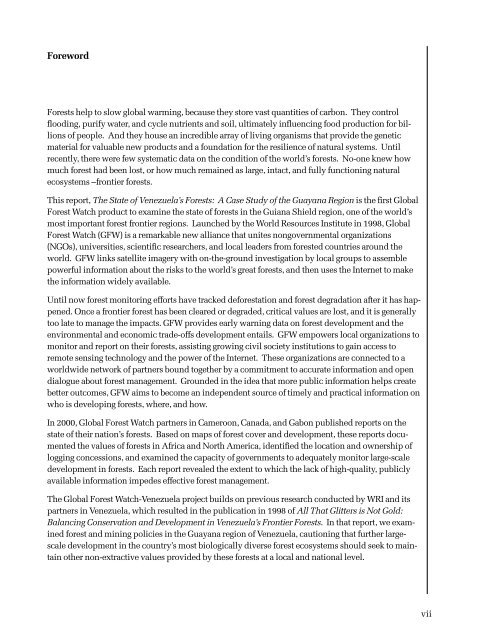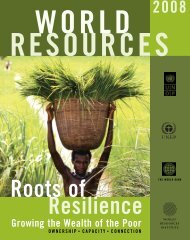Usar pâgs xvii-134 - ResearchGate
Usar pâgs xvii-134 - ResearchGate
Usar pâgs xvii-134 - ResearchGate
Create successful ePaper yourself
Turn your PDF publications into a flip-book with our unique Google optimized e-Paper software.
ForewordForests help to slow global warming, because they store vast quantities of carbon. They controlflooding, purify water, and cycle nutrients and soil, ultimately influencing food production for billionsof people. And they house an incredible array of living organisms that provide the geneticmaterial for valuable new products and a foundation for the resilience of natural systems. Untilrecently, there were few systematic data on the condition of the world’s forests. No-one knew howmuch forest had been lost, or how much remained as large, intact, and fully functioning naturalecosystems –frontier forests.This report, The State of Venezuela’s Forests: A Case Study of the Guayana Region is the first GlobalForest Watch product to examine the state of forests in the Guiana Shield region, one of the world’smost important forest frontier regions. Launched by the World Resources Institute in 1998, GlobalForest Watch (GFW) is a remarkable new alliance that unites nongovernmental organizations(NGOs), universities, scientific researchers, and local leaders from forested countries around theworld. GFW links satellite imagery with on-the-ground investigation by local groups to assemblepowerful information about the risks to the world’s great forests, and then uses the Internet to makethe information widely available.Until now forest monitoring efforts have tracked deforestation and forest degradation after it has happened.Once a frontier forest has been cleared or degraded, critical values are lost, and it is generallytoo late to manage the impacts. GFW provides early warning data on forest development and theenvironmental and economic trade-offs development entails. GFW empowers local organizations tomonitor and report on their forests, assisting growing civil society institutions to gain access toremote sensing technology and the power of the Internet. These organizations are connected to aworldwide network of partners bound together by a commitment to accurate information and opendialogue about forest management. Grounded in the idea that more public information helps createbetter outcomes, GFW aims to become an independent source of timely and practical information onwho is developing forests, where, and how.In 2000, Global Forest Watch partners in Cameroon, Canada, and Gabon published reports on thestate of their nation’s forests. Based on maps of forest cover and development, these reports documentedthe values of forests in Africa and North America, identified the location and ownership oflogging concessions, and examined the capacity of governments to adequately monitor large-scaledevelopment in forests. Each report revealed the extent to which the lack of high-quality, publiclyavailable information impedes effective forest management.The Global Forest Watch-Venezuela project builds on previous research conducted by WRI and itspartners in Venezuela, which resulted in the publication in 1998 of All That Glitters is Not Gold:Balancing Conservation and Development in Venezuela’s Frontier Forests. In that report, we examinedforest and mining policies in the Guayana region of Venezuela, cautioning that further largescaledevelopment in the country’s most biologically diverse forest ecosystems should seek to maintainother non-extractive values provided by these forests at a local and national level.vii
















